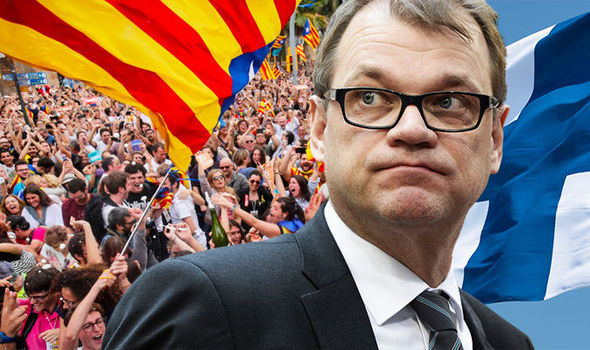29.10.2017 - 16:07
FINLAND could be the first country to officially recognise Catalonia as a republic state, in a move that would put the Scandinavian country in direct opposition to the European Union (EU).
By JON ROGERS
The country’s MP for Lapland Mikko Karna has said that he intends to submit a motion to the Finnish parliament recognising the new fledgling country.
Mr Karna, who is part of the ruling Centre Party, led by Prime Minister Juha Sipila, also sent his congratulations to Catalonia after the regional parliament voted earlier today on breaking away from the rest of Spain.
Should Finland officially recognise the new state of Catalonia this will be yet another body blow to the the EU which has firmly backed the continuation of a unified Spain under the control of Madrid.
European Commission President Jean-Claude Juncker warned today that “cracks” were appearing in the bloc due to the seismic events in Catalonia that were causing ruptures through the bloc.
Donald Tusk, the President of the European Council, said earlier today that for the EU nothing changes despite the Catalan parliament voting to breakaway from Spain.
He said that the EU would continue to only speak with Spain.
Mr Juncker spoke in favour of unity. He said: “I do not want a situation where, tomorrow, the European Union is made up of 95 different states. We need to avoid splits, because we already have enough splits and fractures and we do not need any more.”
If Finland recognised Catalonia then this would make a mockery of the EU’s refusal to acknowledge the region’s new status.
A statement from the European Union on October 2 read: “Under the Spanish Constitution, yesterday’s vote in Catalonia was not legal.
For the European Commission, as President Juncker has reiterated repeatedly, this is an internal matter for Spain that has to be dealt with in line with the constitutional order of Spain.
“We also reiterate the legal position held by this Commission as well as by its predecessors. If a referendum were to be organised in line with the Spanish Constitution it would mean that the territory leaving would find itself outside of the European Union.
“Beyond the purely legal aspects of this matter, the Commission believes that these are times for unity and stability, not divisiveness and fragmentation.
“We call on all relevant players to now move very swiftly from confrontation to dialogue.
“Violence can never be an instrument in politics. We trust the leadership of Prime Minister Mariano Rajoy to manage this difficult process in full respect of the Spanish Constitution and of the fundamental rights of citizens enshrined therein.”
Argentina could also formally recognise the Republic of Catalonia and reject the intervention of the Spanish Prime Minister Mariano Rajoy who has moved to implement Article 155 which will permit Madrid to take over control of the semi-autonomous region.
Socialist Left Argentine MP Juan Carlos Giordano, who represents Buenos Aires Province said that he would present a bill in parliament for the South American country to recognise Catalonia.
The Scottish Government has also sent a message of support, saying that Catalonia “must have” the ability to determine their own future.
Cabinet Secretary for Culture, Tourism and External Affairs Fiona Hyslop said: “We understand and respect the position of the Catalan government.
“While Spain has the right to oppose independence, the people of Catalonia must have the ability to determine their own future. Today’s Declaration of Independence came about only after repeated calls for dialogue were refused. Now, more than ever, the priority of all those who consider themselves friends and allies of Spain should be to encourage a process of dialogue to find a way forward that respects democracy and the rule of law. The imposition of direct rule cannot be the solution and should be of concern to democrats everywhere. The European Union has a political and moral responsibility to support dialogue to identify how the situation can be resolved peacefully and democratically.”
It comes as Britain, France, Germany and the United States backed Madrid.
Downing Street said Britain will not recognise the Catalan parliament’s declaration of independence from Spain.
Prime Minister Theresa May’s official spokesman said the declaration was based on a vote which had been declared illegal and that the UK wanted to see the unity of Spain preserved.
The spokesman said: “The UK does not and will not recognise the unilateral declaration of independence made by the Catalan regional parliament.
“It is based on a vote that was declared illegal by the Spanish courts. We continue to want to see the rule of law upheld, the Spanish constitution respected, and Spanish unity preserved.”
French president Emmanuel Macron said on Friday that he was fully supportive of Spanish Prime Minister Mariano Rajoy, regarding the crisis taking place in Catalonia.
.



